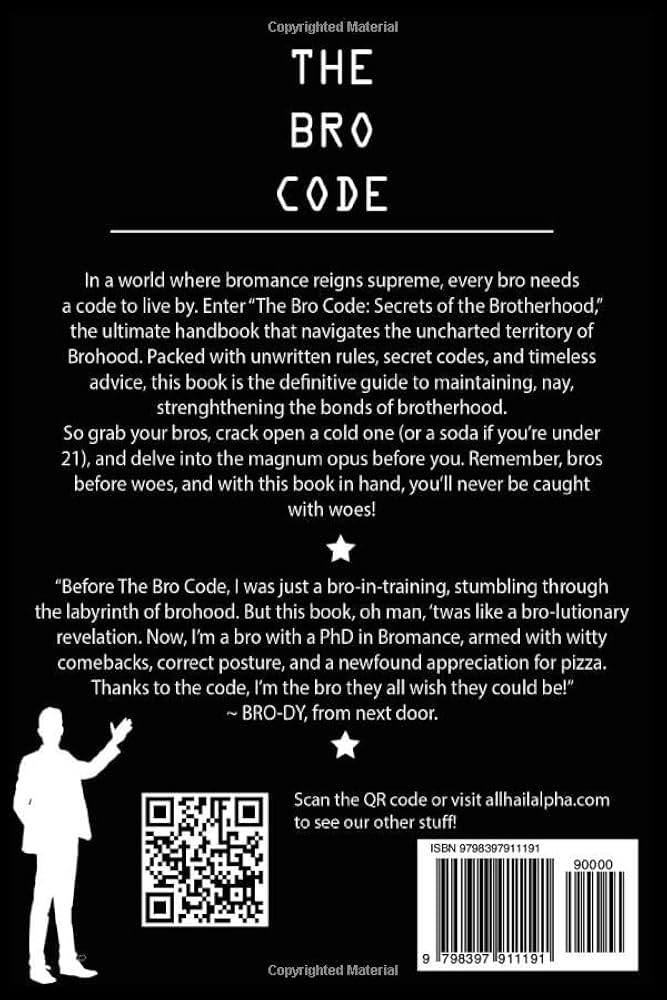The “bro code,” a set of unwritten rules governing male friendships, has become a topic of much debate in recent years. While some men still swear by its principles, others argue that it’s outdated and even harmful. This article will delve into the core tenets of the bro code, examine the criticisms leveled against it, and explore how evolving societal norms and a growing emphasis on mental health are influencing perceptions of male friendship.
This exploration will cover the traditional rules of the bro code, analyze the reasons behind its criticism, and discuss how changing social landscapes and increased awareness of mental well-being are impacting men’s relationships. Ultimately, we aim to shed light on whether the bro code represents a valuable guide for authentic friendships or an outdated set of restrictions hindering genuine connection.
Bro Code Rules
The “bro code” encompasses a range of unwritten rules that supposedly govern male friendships. These rules often emphasize loyalty, stoicism, and a certain level of competitive spirit. Some common tenets include:
- Loyalty above all else: A core principle is unwavering loyalty to your bros, even if they make mistakes or engage in questionable behavior. This can sometimes lead to overlooking harmful actions or enabling negative patterns.
- Never snitch on a bro: This rule dictates that you should never betray a friend’s confidence or reveal their secrets, even if it means protecting them from legal or social consequences.
- No dating your bro’s ex: This rule aims to prevent romantic entanglement with a former partner of a close friend, often based on the assumption that it will inevitably lead to conflict and tension.
These are just a few examples of the rules often associated with the “bro code.” While some may find these principles appealing, others argue they can be restrictive and ultimately detrimental to healthy relationships.
Criticism of the Bro Code

The bro code has faced significant criticism in recent years, with many arguing that its rigid rules perpetuate harmful stereotypes and hinder genuine emotional expression between men.
- Encourages toxic masculinity: Critics argue that the emphasis on stoicism, competition, and loyalty above all else reinforces traditional notions of masculinity that can be damaging to both individuals and society. This can lead to suppression of emotions, avoidance of vulnerability, and difficulty forming healthy attachments.
- Limits emotional expression: The bro code often discourages men from expressing their feelings openly, leading to a culture of emotional repression. This can result in isolation, loneliness, and an inability to seek support when needed.
The rigid nature of the bro code can also create unrealistic expectations and pressure on men to conform to a narrow definition of what it means to be a “good friend.”
Evolving Societal Norms
Societal norms are constantly evolving, and attitudes towards male friendship are no exception. There is a growing recognition that healthy relationships require open communication, emotional vulnerability, and mutual respect. This shift in perspective challenges the traditional tenets of the bro code.
- Increased emphasis on mental health: The increasing focus on mental well-being has led to a greater understanding of the importance of emotional expression and support. Men are now more encouraged to seek help when they need it and to build relationships based on authenticity and vulnerability.
- Challenging gender stereotypes: Society is moving away from rigid gender roles, and men are increasingly expected to express their emotions freely and engage in nurturing relationships. This challenges the notion that stoicism and competition are essential qualities of male friendship.
These evolving norms create a space where alternative models of male friendship can flourish, ones that prioritize emotional connection and genuine support.
Mental Health Awareness

The growing awareness of mental health issues has significantly impacted how we view male friendships. Traditionally, men were often discouraged from expressing their emotions or seeking help for mental health concerns. The bro code, with its emphasis on stoicism and self-reliance, reinforced this harmful pattern.
- Breaking down stigma: Increased awareness of mental health challenges is helping to break down the stigma surrounding these issues. Men are now more likely to talk about their struggles and seek support from friends, family, or professionals.
- Promoting emotional well-being: Recognizing the importance of emotional well-being has led to a shift in focus towards building supportive relationships that encourage open communication and vulnerability.
This emphasis on mental health promotes healthier male friendships based on empathy, understanding, and genuine care for each other’s well-being.
Authentic Relationships
The rise of authentic relationships reflects a broader societal shift towards valuing genuineness and emotional connection over superficiality and conformity. In the context of male friendship, this means moving away from rigid rules and embracing open communication, vulnerability, and mutual support.
- Building trust and intimacy: Authentic friendships are built on a foundation of trust, honesty, and shared experiences. This involves being able to express your true feelings, both positive and negative, without fear of judgment or rejection.
- Supporting each other’s growth: True friends encourage each other’s personal growth and celebrate each other’s successes. They offer support during difficult times and provide a safe space for vulnerability and self-discovery.
By prioritizing authenticity and emotional connection, men can build stronger, more fulfilling friendships that enrich their lives and contribute to a more inclusive and supportive society.
Conclusion
The “bro code,” while once considered a guiding principle for male friendships, is increasingly being challenged in the face of evolving societal norms and a growing emphasis on mental health awareness. Its rigid rules often perpetuate harmful stereotypes and hinder genuine emotional expression between men. As we move towards a more inclusive and authentic society, it’s essential to recognize that healthy male friendships are built on open communication, mutual respect, and genuine support. Embracing vulnerability, challenging outdated norms, and prioritizing emotional well-being will pave the way for stronger, more meaningful connections between men.



